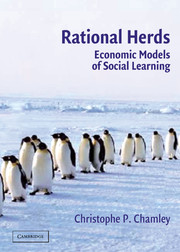Book contents
- Frontmatter
- Contents
- Preface
- 1 Introduction
- PART ONE Social Learning
- 2 Bayesian Tools
- 3 Social Learning with a Common Memory
- 4 Cascades and Herds
- 5 Limited Memories
- 6 Delays
- 7 More Delays
- 8 Outcomes
- 9 Networks and Diffusion
- 10 Words
- PART TWO Coordination
- PART THREE Financial Herding
- References
- Author Index
- Subject Index
3 - Social Learning with a Common Memory
Published online by Cambridge University Press: 12 January 2010
- Frontmatter
- Contents
- Preface
- 1 Introduction
- PART ONE Social Learning
- 2 Bayesian Tools
- 3 Social Learning with a Common Memory
- 4 Cascades and Herds
- 5 Limited Memories
- 6 Delays
- 7 More Delays
- 8 Outcomes
- 9 Networks and Diffusion
- 10 Words
- PART TWO Coordination
- PART THREE Financial Herding
- References
- Author Index
- Subject Index
Summary
Actions speak louder than words.
The basic model of learning from others' actions is presented. Individual actions are the means of communication between agents. When the set of actions is sufficiently large and the actions are observed perfectly, social learning is efficient. When actions are observed through a noise, the public information in history slows down social learning.
Why learn from others' actions? Because these actions reflect something about their information. Why don't we exchange information directly using words? People may not be able to express their information well. They may not speak the same language. They may even try to deceive us. What are we trying to find? A good restaurant, a good movie, a tip on the stock market, whether to delay an investment or not, etc. Other people know something about it, and their knowledge affects their behavior, which, we can trust, will be self-serving. By looking at their behavior, we will infer something about what they know. This chain of arguments will be introduced here and developed in other chapters. We will see how the transmission of information may or may not be efficient and may lead to herd behavior, to sudden changes of widely believed opinions, etc.
For actions to speak and to speak well, theymust have a sufficient vocabulary and be intelligible. In the first model of this chapter, individuals are able to fine-tune their action in a sufficiently rich set, and their decision process is perfectly known. In such a setting, actions reflect perfectly the information of each acting individual.
- Type
- Chapter
- Information
- Rational HerdsEconomic Models of Social Learning, pp. 42 - 57Publisher: Cambridge University PressPrint publication year: 2003



